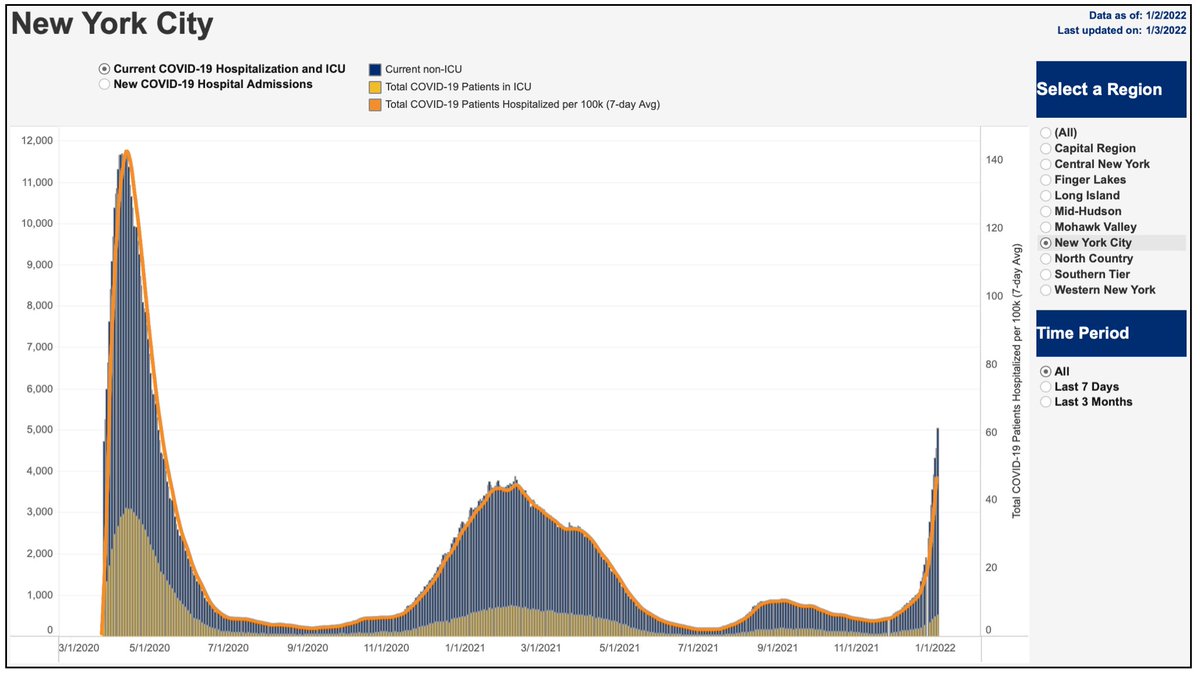
Just leaving the ER.
It was a long day. And a stunning amount of Covid.
Today I worked in an area that was temporarily converted into a makeshift ICU during the first COVID wave.
Here’s what different from then.
And also what challenges we’re facing with this surge in NYC: 🧵
It was a long day. And a stunning amount of Covid.
Today I worked in an area that was temporarily converted into a makeshift ICU during the first COVID wave.
Here’s what different from then.
And also what challenges we’re facing with this surge in NYC: 🧵
Back in March 2020, we were flooded with so many sick and short of breath patients, it seemed like there was nothing we could do.
I almost never feel like that anymore. We’ve learned so much. We have treatments. High-flow oxygen.
That nightmare is over. But this is scary too…
I almost never feel like that anymore. We’ve learned so much. We have treatments. High-flow oxygen.
That nightmare is over. But this is scary too…
https://twitter.com/craig_a_spencer/status/1242302407419269121
During the first surge, COVID was the only thing we saw in our ERs.
Now record-number COVID cases are hitting at a time when our ERs are already seeing extremely high numbers of non-COVID patients too.
Thankfully the Covid patients aren’t as sick.
BUT there’s SO many of them.
Now record-number COVID cases are hitting at a time when our ERs are already seeing extremely high numbers of non-COVID patients too.
Thankfully the Covid patients aren’t as sick.
BUT there’s SO many of them.
https://twitter.com/Craig_A_Spencer/status/1242302412607696896
Today it seemed like everyone had COVID. Like, so many.
And yes, like before, there were some really short of breath and needing oxygen.
But for most, COVID seemed to topple a delicate balance of an underlying illness.
It’s making people really sick in a different way.
And yes, like before, there were some really short of breath and needing oxygen.
But for most, COVID seemed to topple a delicate balance of an underlying illness.
It’s making people really sick in a different way.
Diabetics in whom Covid precipitated diabetic ketoacidosis, a serious and life-threatening condition.
Older folks sick with Covid just too weak to get out of bed. Can’t walk. So can’t leave the hospital.
Thankfully not one needed a ventilator.
Relatively few needed oxygen…
Older folks sick with Covid just too weak to get out of bed. Can’t walk. So can’t leave the hospital.
Thankfully not one needed a ventilator.
Relatively few needed oxygen…
But still so many needed hospitalization.
Right now NYC has over 5,000 Covid hospitalizations.
More than last winter’s peak.
Higher than any point since May 2020.
3 times higher than only two weeks ago.
And still climbing higher everyday.
Right now NYC has over 5,000 Covid hospitalizations.
More than last winter’s peak.
Higher than any point since May 2020.
3 times higher than only two weeks ago.
And still climbing higher everyday.

What’s also different now is those COVID cases are often in beds next to patients who’ve done everything to avoid the virus, and for whom an infection might have a dramatic toll.
The cancer patient on chemotherapy.
Those immunocompromised or severely sick with something else.
The cancer patient on chemotherapy.
Those immunocompromised or severely sick with something else.
Overall it seems Omicron causes milder disease. We aren’t seeing as many patients gasping for air.
But there’s just SO much of it and it’s impacting patients in different ways.
So even if just a tiny portion of cases need to stay in the hospital, it can turn into a huge influx.
But there’s just SO much of it and it’s impacting patients in different ways.
So even if just a tiny portion of cases need to stay in the hospital, it can turn into a huge influx.
Unlike March 2020 we have vaccines. And they remain the best way to stay out of the hospital.
Even with Omicron the unvaccinated still make up a disproportionate share of the sickest COVID patients.
And those needing treatment in the ICU are disproportionately the unvaccinated.
Even with Omicron the unvaccinated still make up a disproportionate share of the sickest COVID patients.
And those needing treatment in the ICU are disproportionately the unvaccinated.

As I sat in the part of the ER that used to serve as a makeshift ICU, I thought about all the really sick patients who lost their life there almost two years ago.
I felt sad for the colleagues we’ve lost to COVID.
I felt sad for my colleagues who are clearly just so exhausted.
I felt sad for the colleagues we’ve lost to COVID.
I felt sad for my colleagues who are clearly just so exhausted.
I felt sick of wearing that damn N95 and face shield for 13 hours, again, after I hoped that phase was behind us.
The next few weeks will be really really tough for us.
A lot of healthcare workers will get sick.
We will have to work short-staffed and take on more patients.
The next few weeks will be really really tough for us.
A lot of healthcare workers will get sick.
We will have to work short-staffed and take on more patients.
If you do need to go to the ER, try to understand we are doing our best.
If you haven’t been vaccinated or boosted yet, now is really the time. It makes a difference.
I know you’re tired of this.
We are too.
But we’ll really need everyone’s help to get through it, again. 🙏
If you haven’t been vaccinated or boosted yet, now is really the time. It makes a difference.
I know you’re tired of this.
We are too.
But we’ll really need everyone’s help to get through it, again. 🙏
• • •
Missing some Tweet in this thread? You can try to
force a refresh




